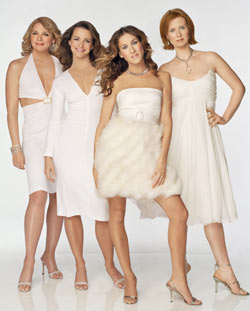 First, a quick apology for the inherent bias in this question. It’s so unfair, yet I’ve noticed that readers who complained about too much sex in my books always castigated the heroine. “Ladies didn’t do that during the Regency” was a comment was directed at a heroine who dared have sex with her husband.
First, a quick apology for the inherent bias in this question. It’s so unfair, yet I’ve noticed that readers who complained about too much sex in my books always castigated the heroine. “Ladies didn’t do that during the Regency” was a comment was directed at a heroine who dared have sex with her husband.
OK, I won’t debate that one 🙂 but these readers have a point, skewed as it is. Historically, women paid the highest consequences for sex, biological and social.
I love SEX AND THE CITY. In all the sexual exploration the four main characters go through, they are searching for something, even if they’re not sure what it is. And when they find it, it’s LOVE. BUT I think it’s dodgy to translate their attitudes to women of the early 19th century. Not that they didn’t have sex–and sometimes outside the rules–and sometimes enjoying it! 🙂 But they were living and loving in a different world, with different stakes.
I admit to having trouble with the Regency heroine who experiments with sex lightly. With the heroine who keeps insisting to herself and everyone else that the hero is a loathesome jerk and the last man on earth she’d ever marry, yet repeatedly has sex with him without ever worrying about social disgrace or pregnancy or destroying her sisters’ chances of making good marriages. Such heroines usually strike me as some combination of needy, confused, selfish or just TSTL.
Yet I love so many sexy Regency era romances.
Things that mitigate the “Lydia Bennet” factor: marriage of convenience, no reputation to lose, supposed infertility (though possibly reversible!), birth control (some forms existed, but it has to make sense that the characters would know about and use it). And emotional commitment.
There’s also this mysterious thing: “heat of the moment”. Sometimes it works for me, sometimes it doesn’t. I’ve written this whole post and I’m still not sure how some authors make me feel that it really is the right moment for the characters to go at it, and why sometimes it just feels too early. Is it just incredibly sensual writing? Or deep enough characterisation that I feel the love even if the characters aren’t fully aware of it?
Maybe part of it is that I want some buildup.
What do you think? When has a heroine gone over from being human and vulnerable to TSTL in matters of sex? What makes “heat of the moment” work, or not? Which authors do you think handle this the best?
Elena
LADY DEARING’S MASQUERADE
www.elenagreene.com





